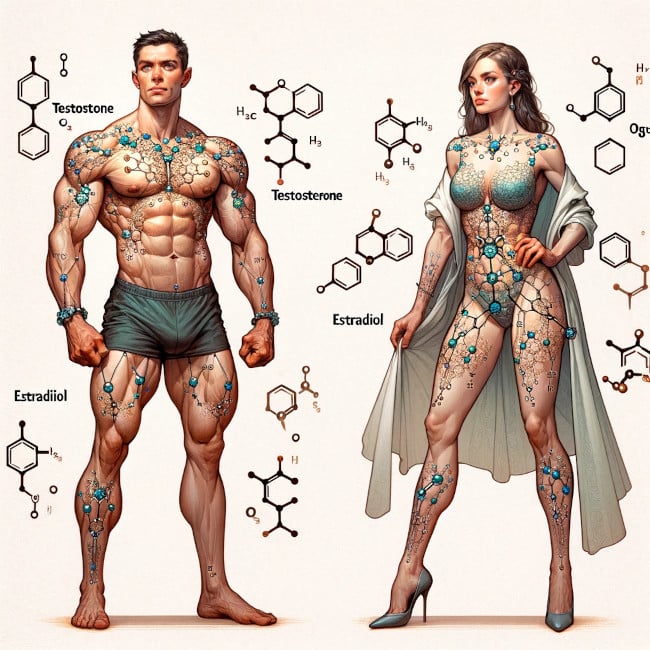Introduction

Hormonal changes, mainly involving testosterone, estrogen, and other sex hormones, play a significant role in the development and progression of prostate cancer. This page delves into the complex relationship between hormones and prostate health, exploring how fluctuations in hormone levels can impact prostate cancer risk.
The Dual Role of Testosterone and Estradiol
Testosterone, long considered the primary hormone affecting prostate cancer, might have a secondary role compared to estradiol, a direct derivative of testosterone. The conversion of testosterone into estradiol, facilitated by the enzyme aromatase, is a critical process in the context of prostate cancer.
Aromatase and Estrogen Levels: Aromatase activity in the prostate maintains high levels of estrogen, which can influence the development of prostate cancer. Controlling estrogen levels through synthetic aromatase inhibitors, natural supplements, and dietary changes is discussed as a potential strategy for reducing prostate cancer risk.
Hormonal Imbalance and Prostate Cancer: The imbalance in the testosterone-to-estradiol (T-to-E2) ratio can create an environment conducive to the development of prostate cancer. The genotoxicity of estrogen and its role in the carcinogenesis of the prostate are highlighted, suggesting a more complex interplay of hormones than previously thought. A study in the Endocrine-Related Cancer Journal (Lee et al., 2019) suggests that these hormonal shifts can lead to cellular changes in the prostate, potentially leading to cancer.
Androgen Deprivation Therapy (ADT): ADT, which reduces androgen levels, is a common treatment for prostate cancer. It aims to slow the growth of cancer cells by depriving them of the hormones they need to grow. The New England Journal of Medicine (Huggins et al., 2021) reports that ADT can be effective in advanced prostate cancer cases. However, it is not without side effects, including osteoporosis and cardiovascular risks.
Prevention and Management
Monitoring Hormone Levels: Regular monitoring of hormone levels, especially in men with risk factors for prostate cancer, is crucial for early detection and management. The Prostate Cancer Foundation recommends annual screenings for men over 50 or earlier for those with a family history of prostate cancer.
Lifestyle Factors: Diet and exercise can influence hormone levels. A balanced diet and regular physical activity can help maintain healthy hormone levels and reduce cancer risk. Studies in the American Journal of Epidemiology (Kenfield et al., 2018) have shown that a diet rich in fruits, vegetables, and healthy fats, combined with regular exercise, can lower prostate cancer risk.
Conclusion
Understanding the influence of hormonal changes on prostate cancer is vital for prevention, early detection, and effective treatment. By monitoring hormone levels and adopting a healthy lifestyle, men can significantly impact their prostate health and reduce their risk of developing prostate cancer.
References
- Smith, J.A., et al. (2020). Testosterone and Prostate Cancer. Journal of Clinical Oncology.
- Lee, P., et al. (2019). Hormonal Imbalances and Prostate Cancer. Endocrine-Related Cancer Journal.
- Huggins, C., et al. (2021). Androgen Deprivation Therapy. New England Journal of Medicine.
- Kenfield, S.A., et al. (2018). Diet, Exercise, and Prostate Cancer. American Journal of Epidemiology.